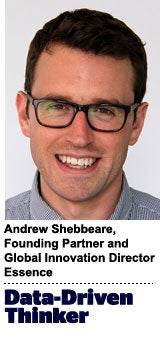 “Data-Driven Thinking” is written by members of the media community and contains fresh ideas on the digital revolution in media.
“Data-Driven Thinking” is written by members of the media community and contains fresh ideas on the digital revolution in media.
Today’s column is written by Andrew Shebbeare, founding partner and global innovation director at Essence.
I believe we are entering the second age of programmatic.
If the first phase of this revolution was characterized by misaligned incentives and closeted skeletons, my hope is that the crescendo of discontent surrounding opaque service models is opening the door to a new era where marketers really start to benefit from all that is good about audience-centric marketing.
I do think, however, that this will also come with some new growing pains.
Different advertisers will experience this programmatic pubescence in varied ways, but whether a client decides to stick with an agency, hire a specialist or take matters in-house, growing up to get the most out of programmatic still means having some adult conversations. And I’ve seen some brands having tough conversations recently as they grapple with their programmatic futures.
Strategy And Creativity
Programmatic often gets pigeonholed as a direct marketing medium or efficiency play. In reality, it can be so much more. I believe the biggest opportunity for programmatic is in transforming brand communications. If we can agree that all of media is heading toward programmatic, it becomes inevitable that it will be primarily a brand marketing tool.
However, this only works when we graduate from selling widgets to telling stories. Great stories require great ideas and teamwork, aligned behind a clear communications objective from beginning to end, including creative, media and analytics. Ideally, this culminates in better creative, driven by data and technology to support an overarching idea but responding to user and environmental context. I don’t think this is particularly well served by the trading desk, managed services or in-house models. In all cases, programmatic experts need to learn the language of creatives and CMOs.
Talent
There is an extraordinary dearth of skilled talent in the market, and you want the best on your team. Creating an environment that will motivate and retain the very best isn’t just about kegerators and foosball, though I very much enjoy these amenities.
It is about more serious matters: inspiring a team, giving them the right challenges and creating an environment where they can be themselves and collaborate to reinvent marketing. A dynamic, questioning, open-minded, results-focused workplace isn’t trivial to perpetuate.
Technology
Advertisers need to take a deep breath and look under the hood of their tech stacks, so they can be certain they’re getting what is best for them.
It is an encouraging first step to see programmatic buying moving closer to the client in some of the big agency networks. Yet big questions remain if a central team still decides which platforms are imposed on brands, while still centralizing and pooling data assets without a clear mandate.
I believe brands should be part of the platform selection process, and even contract directly with platform owners if they have the appetite. Their audience data is their own, and it’s perhaps their most precious marketing asset.
Transaction Costs
It’s a given that forward-thinking marketers graduating programmatic 101 are demanding transparency. Perhaps less obvious is that when the blinkers come off, marketers come to realize that trading desk margins have been masking costs as well as profit. This can result in some sticker shock when you add the effective CPM of brand safety, ad serving, audience validation, viewability and brand studies, which can eat 10% to 15% into “working media.”
Procurement teams will struggle with agency commissions that appear significantly higher than they are used to. Worse, the historical cross-subsidization from trading desk profits has propped up other businesses priced at a loss, so advertisers may even see costs rise elsewhere. Everyone should negotiate hard, but the industry needs to recognize that you get what you pay for, and skimping on smarts is the ultimate false economy.
Real Science
Delivering world-class analytics requires immense dedication. It takes a significant investment and remarkable diversity of talent to manage and transform massive data sets, run large-scale statistical models and design experiments that really pinpoint the causal impact of marketing.
To add insult to injury, robust analytics will shine the light on some uncomfortable truths. Remarketing, for example, is likely not as incremental as reported. And smart optimization might not be building long-term gain. It isn’t easy explaining to a CFO that an expensive team of analysts were hired to prove that previously recognized gains weren’t real, but that is necessary to building a better business and a more mature, sustainable marketing program.
I, for one, am glad to see this change in our industry and think it is necessary for programmatic to fulfill its promise. Many of these changes will be uncomfortable for a lot of people, and not just those in agencies. I think these five challenges will be particularly hard for DSP-managed services and in-house teams to tackle. I have been there – maintaining clear perspective and leading-edge capabilities across the spectrum while retaining the best talent is difficult in these environments.
I firmly believe that agencies should be best-placed to solve for these needs. Real “agents” acting in their clients’ best interests can bring together extraordinary talent, leverage scale, provide deep subject matter expertise, create an environment where specialists can thrive and deliver real unbiased advice. This demands that they embrace transparency, connect strategic thought with real-time bidding, have honest and realistic conversations with their clients and treat their audiences like grown-ups. Perhaps then, clients will show agencies the same courtesy.
Follow Essence (@essencedigital) and AdExchanger (@adexchanger) on Twitter.













